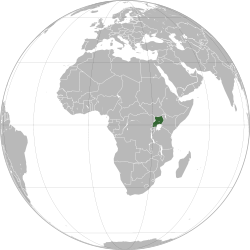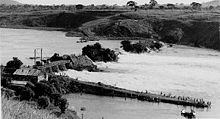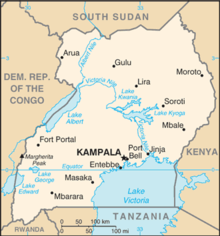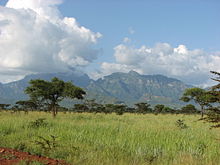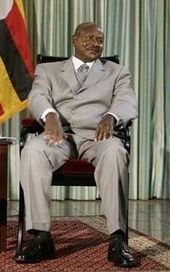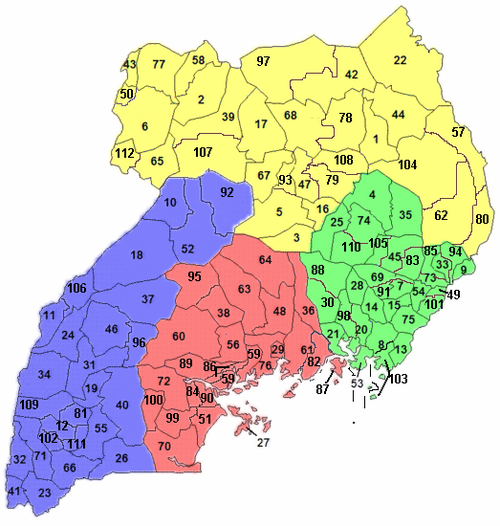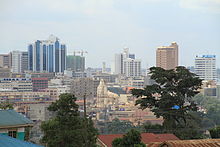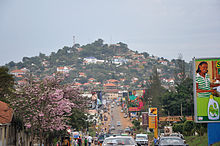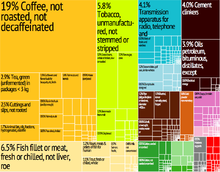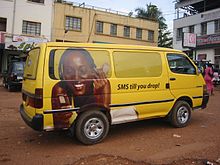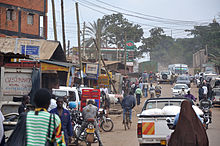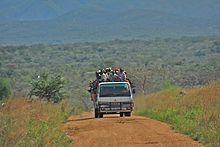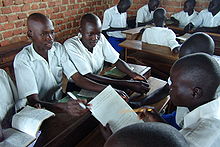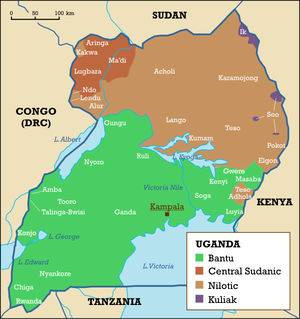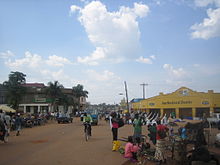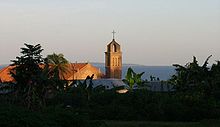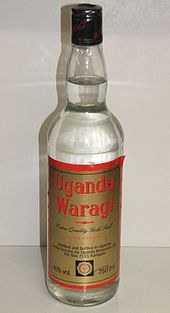
Uganda
Background to the schools Wikipedia
SOS Children volunteers helped choose articles and made other curriculum material SOS Children works in 45 African countries; can you help a child in Africa?
Coordinates: 1.28°N 32.39°E
| Republic of Uganda Jamhuri ya Uganda
|
||||||
|---|---|---|---|---|---|---|
|
||||||
| Motto: "Kwa ajili ya Mungu na Nchi yangu" "For God and My Country" |
||||||
| Anthem: Oh Uganda, Land of Beauty | ||||||
|
|
||||||
| Capital and largest city |
Kampala | |||||
| Official languages |
|
|||||
| Vernacular languages |
|
|||||
| Ethnic groups (2002) |
|
|||||
| Demonym | Ugandan | |||||
| Government | Presidential republic | |||||
| - | President | Yoweri Museveni | ||||
| - | Prime Minister | Amama Mbabazi | ||||
| Legislature | Parliament | |||||
| Independence | ||||||
| - | from the United Kingdom | 9 October 1962 | ||||
| - | Current constitution | 8 October 1995 | ||||
| Area | ||||||
| - | Total | 236,040 km2 ( 81st) 91,136 sq mi |
||||
| - | Water (%) | 15.39 | ||||
| Population | ||||||
| - | 2012 estimate | 35,873,253 ( 35th) | ||||
| - | 2002 census | 24,227,297 | ||||
| - | Density | 137.1/km2 ( 80th) 355.2/sq mi |
||||
| GDP ( PPP) | 2011 estimate | |||||
| - | Total | $46.368 billion | ||||
| - | Per capita | $1,341 | ||||
| GDP (nominal) | 2012 estimate | |||||
| - | Total | $19.399 billion | ||||
| - | Per capita | $532 | ||||
| Gini (1998) | 43 medium |
|||||
| HDI (2011) | low · 161st |
|||||
| Currency | Ugandan shilling ( UGX) |
|||||
| Time zone | EAT ( UTC+3) | |||||
| - | Summer ( DST) | not observed ( UTC+3) | ||||
| Drives on the | left | |||||
| Calling code | +256a | |||||
| ISO 3166 code | UG | |||||
| Internet TLD | .ug | |||||
| a. | +006 from Kenya and Tanzania. | |||||
Uganda (pron.: / juː ˈ ɡ æ n d ə / yew-GAN-də or / juː ˈ ɡ ɑː n d ə / yew-GAHN-də), officially the Republic of Uganda, is a landlocked country in East Africa. Uganda is bordered on the east by Kenya, on the north by South Sudan, on the west by the Democratic Republic of the Congo, on the southwest by Rwanda, and on the south by Tanzania. The southern part of the country includes a substantial portion of Lake Victoria, shared with Kenya and Tanzania.
Uganda takes its name from the Buganda kingdom, which encompasses a large portion of the south of the country including the capital Kampala. The people of Uganda were hunter-gatherers until 1,700 to 2,300 years ago, when Bantu-speaking populations migrated to the southern parts of the country. The area was ruled by the British beginning in the late 1800s. Uganda gained independence from Britain on 9 October 1962. The period since then has been marked by intermittent conflicts, most recently a civil war against the Lord's Resistance Army.
The official languages are English and Swahili. Luganda, a southern language, is widely spoken across the country, although multiple other languages are spoken in the country. The current President of Uganda is Yoweri Kaguta Museveni.
History
The Ugandans were hunter-gatherers until 1,700 to 2,300 years ago. Bantu-speaking populations, who were probably from central Africa, migrated to the southern parts of the country. These groups brought and developed ironworking skills and new ideas of social and political organization. The Empire of Kitara covered most of the great lakes area, from Lake Albert, Lake Tanganyika, Lake Victoria, to Lake Kyoga. Its leadership headquarters were mainly in what became Ankole, believed to have been run by the Bachwezi dynasty in the fourteenth and fifteenth centuries, who may have followed a semi-legendary dynasty known as the Batembuzi. Bunyoro-Kitara is claimed as the antecedent of later kingdoms; Buganda, Toro, Ankole and Busoga. The Nilotic Luo invasion is believed to have led to the collapse of the Chwezi Empire. The twins Rukidi Mpuuga and Kato Kintu are believed to be the first kings of Bunyonro and Buganda after the Chwezi Empire collapsed, creating the Babiito and Bambejja Dynasty. Nilotic people including Luo and Ateker entered the area from the north, probably beginning about A.D. 120. They were cattle herders and subsistence farmers who settled mainly in the northern and eastern parts of the country. Some Luo invaded the area of Bunyoro and assimilated with the Bantu there, establishing the Babiito dynasty of the current Omukama (ruler) of Bunyoro-Kitara. Luo migration continued until the 16th century, with some Luo settling amid Bantu people in Eastern Uganda, with others proceeding to the eastern shores of Lake Victoria in Kenya and Tanzania. The Ateker ( Karimojong and Iteso) settled in the northeastern and eastern parts of the country, and some fused with the Luo in the area north of Lake Kyoga.
Arab traders moved inland from the Indian Ocean coast of East Africa in the 1830s. They were followed in the 1860s by British explorers searching for the source of the Nile. Protestant missionaries entered the country in 1877, followed by Catholic missionaries in 1879. The United Kingdom placed the area under the charter of the British East Africa Company in 1888, and ruled it as a protectorate from 1894.
In the 1890s, 32,000 labourers from British India were brought to East Africa under indentured labour contracts to work on the construction of the Uganda Railway. Most of the surviving Indians returned home, but 6,724 decided to remain in East Africa after the line's completion.
As several other territories and chiefdoms were integrated, the final protectorate called Uganda took shape in 1914. From 1900 to 1920, a sleeping sickness epidemic killed more than 250,000 people, about two-thirds of the population in the affected lake-shore areas.
Uganda gained independence from Britain in 1962, maintaining its Commonwealth membership. The first post-independence election, held in 1962, was won by an alliance between the Uganda People's Congress (UPC) and Kabaka Yekka (KY). UPC and KY formed the first post-independence government with Milton Obote as executive Prime Minister, the Buganda Kabaka (King) Edward Muteesa II holding the largely ceremonial position of President and William Wilberforce Nadiope, the Kyabazinga (paramount chief) of Busoga, as Vice President.
In 1966, following a power struggle between the Obote-led government and King Muteesa, the UPC-dominated Parliament changed the constitution and removed the ceremonial president and vice president. In 1967, a new constitution proclaimed Uganda a republic and abolished the traditional kingdoms. Without first calling elections, Obote was declared the executive President.
After a military coup in 1971, Obote was deposed from power and the dictator Idi Amin seized control of the country. Amin ruled Uganda with the military for the next eight years and carried out mass killings within the country to maintain his rule. An estimated 300,000 Ugandans lost their lives at the hands of his regime. Aside from his brutalities, he forcibly removed the entrepreneurial South Asian minority from Uganda, which left the country's economy in ruins. Amin's atrocities were graphically accounted in the 1977 book, "A State of Blood," which was written by one of his former ministers after he fled the country.
Amin's reign was ended after the Uganda-Tanzania War in 1979 in which Tanzanian forces aided by Ugandan exiles invaded Uganda. This led to the return of Obote, who was deposed once more in 1985 by General Tito Okello. Okello ruled for six months until he was deposed after the so-called " bush war" by the National Resistance Army (NRA) operating under the leadership of the current president, Yoweri Museveni, and various rebel groups, including the Federal Democratic Movement of Andrew Kayiira, and another belonging to John Nkwaanga.
Museveni has been in power since 1986. In the mid- to late 1990s, he was lauded by the West as part of a new generation of African leaders. Conflict in northern Uganda has killed thousands and displaced millions.
Geography
The country is located on the East African plateau, lying mostly between latitudes 4°N and 2°S (a small area is north of 4°), and longitudes 29° and 35°E. It averages about 1,100 metres (3,609 ft) above sea level, and this slopes very steadily downwards to the Sudanese Plain to the north. However, much of the south is poorly drained, while the centre is dominated by Lake Kyoga, which is also surrounded by extensive marshy areas. Uganda lies almost completely within the Nile basin. The Victoria Nile drains from the lake into Lake Kyoga and thence into Lake Albert on the Congolese border. It then runs northwards into South Sudan. One small area on the eastern edge of Uganda is drained by the Turkwel River, part of the internal drainage basin of Lake Turkana.
Lake Kyoga serves as a rough boundary between Bantu speakers in the south and Nilotic and Central Sudanic language speakers in the north. Despite the division between north and south in political affairs, this linguistic boundary runs roughly from northwest to southeast, near the course of the Nile. However, many Ugandans live among people who speak different languages, especially in rural areas. Some sources describe regional variation in terms of physical characteristics, clothing, bodily adornment, and mannerisms, but others claim that those differences are disappearing.
Although generally equatorial, the climate is not uniform as the altitude modifies the climate. Southern Uganda is wetter with rain generally spread throughout the year. At Entebbe on the northern shore of Lake Victoria, most rain falls from March to June and in the November/December period. Further to the north a dry season gradually emerges; at Gulu about 120 km from the South Sudanese border, November to February is much drier than the rest of the year.
The northeastern Karamoja region has the driest climate and is prone to droughts in some years. Rwenzori, a snowy peaked mountainous region on the southwest border with Congo (DRC), receives heavy rain all year round and is the source of the Nile. The south of the country is heavily influenced by one of the world's biggest lakes, Lake Victoria, which contains many islands. It prevents temperatures from varying significantly and increases cloudiness and rainfall. Most important cities are located in the south, near Lake Victoria, including the capital Kampala and the nearby city of Entebbe.
Although landlocked, Uganda contains many large lakes; besides Lake Victoria and Lake Kyoga, there are Lake Albert, Lake Edward and the smaller Lake George.
Environment and conservation
Government and politics
The President of Uganda, currently Yoweri Kaguta Museveni, is both head of state and head of government. The President appoints a Vice President, currently Edward Ssekandi, and a prime minister, currently Amama Mbabazi, who aid him in governing. The parliament is formed by the National Assembly, which has 332 members. 104 of these members are nominated by interest groups, including women and the army. The remaining members are elected for five-year terms during general elections.
Political parties in Uganda were restricted in their activities beginning in 1986, in a measure ostensibly designed to reduce sectarian violence. In the non-party "Movement" system instituted by Museveni, political parties continued to exist, but they could only operate a headquarters office. They could not open branches, hold rallies, or field candidates directly (although electoral candidates could belong to political parties). A constitutional referendum canceled this nineteen-year ban on multi-party politics in July 2005. Additionally, the constitutional term limit for the presidency was changed from the previous two-term limit, in order to enable the current president to continue in active politics.
Presidential elections were held in February 2006. Yoweri Museveni ran against several candidates, the most prominent of them being Dr. Kizza Besigye.
On Sunday, 20 February 2011, the Uganda Electoral Commission declared the 24-year reigning president Yoweri Kaguta Museveni the winning candidate of the 2011 elections that were held on the 18th of February 2011. The opposition were, however, not satisfied with the results, condemning them as full of sham and rigging. According to the results released, Museveni won with 68% of the votes, easily topping his nearest challenger Kizza Besigye. Besigye, who was formerly Museveni's physician, told reporters that he and his supporters 'downrightly snub' the outcome as well as the unremitting rule of Museveni or any person he may appoint. Besigye added that the rigged elections would definitely lead to an illegitimate lead and that it is up to Ugandans to critically analyse this.
The EU Election Observation Mission reported on improvements and flaws of the Ugandan electoral process: "The electoral campaign and polling day were conducted in a peaceful manner [...] However, the electoral process was marred by avoidable administrative and logistical failures that led to an unacceptable number of Ugandan citizens being disfranchised." Since August 2012, hacktivist group Anonymous has threatened Ugandan officials and hacked official government websites over its anti-gay bills. Some international donors have threatened to cut financial aid to the country if anti-gay bills continue.
Museveni will be heading Uganda for another 4 years, with the next elections anticipated to be held in 2016.
Uganda is rated among countries perceived as very corrupt by Transparency International. It is rated at 29 on a scale from 0 (perceived as most corrupt) to 100 (perceived as clean).
Political divisions
Uganda is divided into districts, spread across four administrative regions: Northern, Eastern, Central (Kingdom of Buganda) and Western. The districts are subdivided into counties. A number of districts have been added in the past few years, and eight others were added on 1 July 2006 plus others added in 2010. There are now over 100 districts. Most districts are named after their main commercial and administrative towns. Each district is divided into sub-districts, counties, sub-counties, parishes and villages.
Parallel with the state administration, five traditional Bantu kingdoms have remained, enjoying some degrees of mainly cultural autonomy. The kingdoms are Toro, Busoga, Bunyoro, Buganda and Rwenzururu. Furthermore, some groups attempt to restore Ankole as one of the officially recognized traditional kingdoms, to no avail yet.
Foreign relations and military
In Uganda, the Uganda People's Defence Force serves as the military. The number of military personnel in Uganda has an estimated 45,000 soldiers on active duty. Invisible Children, Inc. in the United States has pressured celebrities and legislatures to request foreign intervention to strengthen their military and remove Joseph Kony. As a result, the YouTube video received millions of views.
Economy
The Bank of Uganda is the Central bank of Uganda and handles monetary policy along with the printing of the Ugandan shilling.
For decades, Uganda's economy suffered from devastating economic policies and instability, leaving Uganda as one of the world's poorest countries. The country has commenced economic reforms and growth has been robust. In 2008, Uganda recorded 7% growth despite the global downturn and regional instability.
Uganda has substantial natural resources, including fertile soils, regular rainfall, and sizable mineral deposits of copper and cobalt. The country has largely untapped reserves of both crude oil and natural gas. While agriculture accounted for 56% of the economy in 1986, with coffee as its main export, it has now been surpassed by the services sector, which accounted for 52% of percent GDP in 2007. In the 1950s the British Colonial regime encouraged some 500,000 subsistence farmers to join co-operatives. Since 1986, the government (with the support of foreign countries and international agencies) has acted to rehabilitate an economy devastated during the regime of Idi Amin and the subsequent civil war. Inflation ran at 240% in 1987 and 42% in June 1992, and was 5.1% in 2003.
Between 1990 and 2001, the economy grew because of continued investment in the rehabilitation of infrastructure, improved incentives for production and exports, reduced inflation and gradually improved domestic security. Ugandan involvement in the war in the Democratic Republic of the Congo, corruption within the government, and slippage in the government's determination to press reforms raise doubts about the continuation of strong growth.
In 2000, Uganda was included in the Heavily Indebted Poor Countries (HIPC) debt relief initiative worth $1.3 billion and Paris Club debt relief worth $145 million. These amounts combined with the original HIPC debt relief added up to about $2 billion. In 2006 the Ugandan Government successfully paid all their debts to the Paris Club, which meant that it was no longer in the (HIPC) list. Growth for 2001–2002 was solid despite continued decline in the price of coffee, Uganda's principal export. According to IMF statistics, in 2004 Uganda's GDP per capita reached $300, a much higher level than in the 1980s but still at half the Sub-Saharan African average income of $600 per year. Total GDP crossed the 8 billion dollar mark in the same year.
Economic growth has not always led to poverty reduction. Despite an average annual growth of 2.5% between 2000 and 2003, poverty levels increased by 3.8% during that time. This has highlighted the importance of avoiding jobless growth and is part of the rising awareness in development circles of the need for equitable growth not just in Uganda, but across the developing world.
With the Uganda securities exchanges established in 1996, several equities have been listed. The Government has used the stock market as an avenue for privatisation. All Government treasury issues are listed on the securities exchange. The Capital Markets Authority has licensed 18 brokers, asset managers and investment advisors including names like: African Alliance Investment Bank, Baroda Capital Markets Uganda Limited, Crane Financial Services Uganda Limited, Crested Stocks and Securities Limited, Dyer & Blair Investment Bank, Equity Stock Brokers Uganda Limited, Renaissance Capital Investment Bank and UAP Financial Services Limited. As one of the ways of increasing formal domestic savings, pension sector reform is the centre of attention (2007).
Uganda traditionally depends on Kenya for access to the Indian Ocean port of Mombasa. Recently, efforts have intensified to establish a second access route to the sea via the lakeside ports of Bukasa in Uganda, and Musoma in Tanzania, connected by railway to Arusha in the Tanzanian interior and to the port of Tanga on the Indian Ocean. Uganda is a member of the East African Community and a potential member of the planned East African Federation.
Uganda has a large diaspora – residing mainly in the United States and the United Kingdom. This diaspora has contributed enormously to Uganda’s economic growth through remittances and other investments (especially property). According to the World Bank, in 2010/2011 Uganda got $694 million in remittances from Ugandans abroad, the highest foreign exchange earner for the country. Uganda also serves as an economic hub for a number of neighbouring countries like the Democratic Republic of Congo, South Sudan and Rwanda.
Poverty
Uganda is one of the poorest nations in the world, with 37.7 percent of the population living on less than $1.25 a day. Despite making enormous progress in reducing the countrywide poverty incidence from 56 percent of the population in 1992 to 31 percent in 2005, poverty remains deep-rooted in the country’s rural areas, which are home to more than 85 per cent of Ugandans.
People in rural areas of Uganda depend on farming as the main source of income and 90 per cent of all rural women work in the agricultural sector. In addition to agricultural work, rural women also have the responsibility of caretaking within their families. The average Ugandan woman spends 9 hours a day on domestic tasks, such as preparing food and clothing, fetching water and firewood, and caring for the elderly, the sick as well as orphans. As such, women on average work longer hours than men, between 12 and 18 hours per day, with a mean of 15 hours, as compared to men, who work between 8 and 10 hours a day.
To supplement their income, rural women may engage in small-scale entrepreneurial activities such as rearing and selling local breeds of animals. Nonetheless, because of their heavy workload, they have little time for these income-generating activities. The poor cannot support their children at school and in most cases, girls drop out of school to help out in domestic work or to get married. Other girls engage in sex work. As a result, young women tend to have older and more sexually experienced partners and this puts women at a disproportionate risk of getting affected by HIV, accounting for about 57 per cent of all adults living with HIV. Maternal health in rural Uganda lags behind national policy targets and the Millennium Development Goals, with geographical inaccessibility, lack of transport and financial burdens identified as key demand-side constraints to accessing maternal health services; as such, interventions like intermediate transport mechanisms have been adopted as a means to improve women's access to maternal health care services in rural regions of the country.
Gender inequality is a main hindrance to reducing women’s poverty. Women must submit to an overall lower social status than men. For many women, this reduces their power to act independently, participate in community life, become educated and escape reliance upon abusive men.
Uganda has realized that the lack of women’s rights is part of the major causes of poverty in the country. Results of the 1998/99 Uganda Participatory Poverty Assessment (UPPAP) – on which the revised Poverty Eradication Action Plan (PEAP) is based – and the UPPAP2 (2001/2002) demonstrate strong linkage between gender and poverty. Key policies such as the National Gender Policy in 1997 have also been enacted to mainstream gender in the national development process to improve the social, legal/civic, political, economic and cultural conditions of the people, especially of women. Also, the National Action Plan on Women (NAPW) was implemented in 1999 to identify five critical areas for action in order to advance women’s rights: legal and policy framework and leadership; social and economic empowerment of women; reproductive health, rights and responsibilities; girl child education; peace building conflict resolution and freedom from violence.
Infrastructure
Science and technology
In Uganda, Uganda Telecom is a network of telecommunications companies compiled of 8 companies that serves 10 million subscribers in a population of 32 million.
On March 1, 2012, 17 million subscribers received SIM cards for mobile phones.
Transportation
In Uganda, the Uganda Railways Corporation developed four railway lines. There are four Uganda Airports with paved runways and 22 runways unpaved.
Energy
In Uganda, the majority of energy comes from charcoal and wood in the 1980s. However, oil has been found in the Lake Albert area totaling an estimated 95,000,000 m3 barrels of crude existed there. Heritage Oil discovered one of the largest crude oil finds in Uganda and continues operations there.
Education
At the 2002 census, Uganda had a literacy rate of 66.8% (76.8% male and 57.7% female). Public spending on education was at 5.2% of the 2002–2005 GDP. Much public education in primary and secondary schools focuses upon repetition and memorization. There are also state exams that must be taken at every level of education. Uganda has both private and public universities. The largest university in Uganda is Makerere University, located outside of Kampala. The system of education in Uganda has a structure of 7 years of primary education, 6 years of secondary education (divided into 4 years of lower secondary and 2 years of upper secondary school), and 3 to 5 years of post-secondary education. The present system has existed since the early 1960s. Although some primary education is compulsory under law, in many rural communities this is not observed as many families feel they cannot afford costs such as uniforms and equipment. State schools are usually run by the Church of Uganda and are built on land owned as such. In primary education, children sit exams at the end of each academic year in order to discern whether they are to progress to the next class; this leads to some classes which include a large range of ages. Upon completing P7 (The final year of primary education), many children from poorer rural communities will return to their families for subsistence farming. Secondary education is focused mainly in larger cities, with boarding optional. Children are usually presented with an equipment list which they are to obtain at the beginning of their time at secondary school. This list classically includes items such as writing equipment, toilet roll and cleaning brushes, all of which the student must have upon admission to school.
In Uganda, there are Universities such as the Makerere University located in the Kampala District. Milton Obote, former President of Uganda, was an alumnus.
Crime and law enforcement
In Uganda, the Allied Democratic Forces is considered a violent rebel force that opposes the Ugandan government. These rebels are an enemy of the Uganda People's Defence Force and are considered an affiliate of Al-Shabaab.
Demographics
Languages
In Uganda, there are forty languages that fall into three main families; Bantu, Nilotic and Central Sudanic.
Uganda is home to many different ethnic groups, none of whom forms a majority of the population. Around forty different languages are regularly and currently in use in the country. English became the official language of Uganda after independence. Ugandan English is a local variant dialect.
The most widely spoken local language in Uganda is Luganda, spoken predominantly by the Ganda people (Baganda) in the urban concentrations of Kampala, the capital city, and in towns and localities in the Buganda region of Uganda which encompasses Kampala. The Lusoga and Runyankore-Rukiga languages follow, spoken predominantly in the southeastern and southwestern parts of Uganda respectively.
Swahili, a widely used language throughout eastern and central East Africa, was approved as the country's second official national language in 2005, though this is somewhat politically sensitive. Though the language has not been favoured by the Bantu-speaking populations of the south and southwest of the country, it is an important lingua franca in the northern regions. It is also widely used in the police and military forces, which may be a historical result of the disproportionate recruitment of northerners into the security forces during the colonial period. The status of Swahili has thus alternated with the political group in power. For example, Amin, who came from the northwest, declared Swahili to be the national language.
Uganda’s population has grown from 4.8 million people in 1950 to 24.3 million in 2002. The current estimated population of Uganda is 35 million. Uganda has a very young population, with a median age of 15 years.
The population of Uganda consists of: Baganda 16.9%, Banyakole 9.5%, Basoga 8.4%, Bakiga 6.9%, Iteso 6.4%, Langi 6.1%, Acholi 4.7%, Bagisu 4.6%, Lugbara 4.2%, Bunyoro 2.7%, other 29.6%. Uganda has the second highest total fertility rate in the world, at 6.65 children born/woman (2012 estimates).
Largest cities
| Largest cities or towns of Uganda http://www.geonames.org/UG/largest-cities-in-uganda.html |
|||||||||
|---|---|---|---|---|---|---|---|---|---|
| Rank | City name | District | Pop.
|
||||||
 Kampala |
1 | Kampala | Kampala | 1 353 189 | |||||
| 2 | Gulu | Gulu | 146 858 | ||||||
| 3 | Lira | Lira | 119 323 | ||||||
| 4 | Mbarara | Mbarara | 97 500 | ||||||
| 5 | Jinja | Jinja | 93 061 | ||||||
| 6 | Bwizibwera | Mbarara | 79 157 | ||||||
| 7 | Mbale | Mbale | 76 493 | ||||||
| 8 | Mukono | Mukono | 67 290 | ||||||
| 9 | Kasese | Kasese | 67 269 | ||||||
| 10 | Masaka | Masaka | 65 373 | ||||||
Religion
According to the census of 2002, Christians made up about 84% of Uganda's population. The Roman Catholic Church has the largest number of adherents (41.9%), followed by the Anglican Church of Uganda (35.9%). Evangelical and Pentecostal churches claim the rest of the Christian population. The next most reported religion of Uganda is Islam, with Muslims representing 12% of the population. The Muslim population is primarily Sunni; there is also a minority belonging to the Ahmadiyya Muslim Community. The remainder of the population follow traditional religions (1%), Baha'i (0.1%), other non-Christian religions (0.7%), or have no religious affiliation (0.9%).
The northern and West Nile regions are predominantly Catholic, while the Iganga District in eastern Uganda has the highest percentage of Muslims. The rest of the country has a mix of religious affiliations.
Traditional indigenous beliefs are practiced in some rural areas and are sometimes blended with or practiced alongside Christianity or Islam. In addition to a small community of Jewish expatriates centered in Kampala, Uganda is home to the Abayudaya, a native Jewish community dating from the early 1900s. One of the world's seven Bahá'í Houses of Worship is located on the outskirts of Kampala. See also Bahá'í Faith in Uganda.
Founded by JJ Keki, an interfaith movement bringing together Muslim, Jewish, and Christian coffee farmers has resulted in the Mirembe Kawomera (Delicious Peace) Fair Trade Coffee Cooperative in Mbale, Uganda. Members of the cooperative sing about interfaith peace in Uganda on the Smithsonian Folkways album "Delicious Peace: Coffee, Music & Interfaith Harmony in Uganda."
According to the World Refugee Survey 2008, published by the U.S. Committee for Refugees and Immigrants, Uganda hosted a population of refugees and asylum seekers numbering 235,800 in 2007. The majority of this population came from Sudan (162,100 persons), but also included refugees and asylum seekers from the Democratic Republic of the Congo (41,800), Rwanda (21,200), Somalia (5,700) and Burundi (3,100).
Indian nationals are the most significant immigrant population; members of this community are primarily Ismaili (Shi'a Muslim followers of the Aga Khan) or Hindu. Forty years ago, there were about 80,000 Indians in Uganda. After Idi Amin mandated the expulsion of the Ugandan-Asians (mostly of Indian origin), the population was greatly reduced. Today there are about 15,000.
Culture
Music
Ugandan music is as diverse as the ethnicity of its people. The country is home to over 30 different ethnic groups and tribes and they form the basis of all indigenous music. The Baganda, being the most prominent tribe in the country, have dominated the culture and music of Uganda over the last two centuries. However, the other tribes all have their own music styles passed down from generations dating back to the 18th century. These variations all make for good diversity in music and culture.
Music is an important cultural and communicative tool in Uganda. In recent years, Smithsonian Folkways has produced two albums featuring traditional music of the region: "Abayudaya: Music from the Jewish People of Ugandan" and "Delicious Peace: Coffee, Music & Interfaith Harmony in Uganda"
Sport
Owing to the large number of communities, culture within Uganda is diverse. Many Asians (mostly from India) who were expelled during the regime of Amin have returned to Uganda.
Football is the national sport in Uganda. Games involving the Ugandan national football team usually attract large crowds of Ugandans from all walks of life. The Ugandan Super League is the top division of Ugandan football contested by 16 clubs from across the country; it was created in 1968. Football in Uganda is managed by the Federation of Uganda Football Associations (FUFA). The association administers the national football team, as well as the Super League. South African broadcaster DStv through its Super Sport network broadcasts the Ugandan League to 46 different countries in sub Saharan Africa. Football is played all over Uganda especially by children in schools and young people on a variety of pitch surfaces. Uganda's most famous footballers are David Obua of Scottish club Hearts and Ibrahim Sekagya, who is the captain of the national team, Austria's Red Bulls and Nestroy Kizito. Uganda's notable past greats of the game include Denis Obua, Majid Musisi, Fimbo Mukasa and Paul Kasule.

Cricket has experienced rapid growth in Uganda, although football is the national sport. Recently in the Quadrangular Tournament in Kenya, Uganda came in as the underdogs and went on to register a historic win against archrivals Kenya. Uganda also won the World Cricket League (WCL) Division 3 and came in fourth place in the WCL Division 2. In February 2009, Uganda finished as runner-up in the WCL Division 3 competition held in Argentina, thus gaining a place in the World Cup Qualifier held in South Africa in April 2009.
In 2007, the Uganda national rugby union team were victorious in the 2007 Africa Cup, beating Madagascar in the final.
Rallying is a popular sport in Uganda with the country having successfully staged a round of the African Rally Championship (ARC), Pearl of Africa Rally since 1996, when it was a candidate event. The country has gone on to produce African rally champions such as Charles Muhangi, who won the 1999 ARC crown. Other notable Ugandans on the African rally scene include the late Riyaz Kurji, who was killed in a fatal accident while leading the 2009 edition, Emma Katto, Karim Hirji, Chipper Adams and Charles Lubega. Ugandans have also featured prominently in the Safari Rally.
Ugandans have played hockey since the early 1920s. It was originally played by Asians, but now is widely played by people from other racial backgrounds. Hockey is the only Ugandan field sport to date to have qualified for and represented the country at the Olympics; this was at the 1972 Summer Olympics. Uganda has won gold medals at the Olympics in athletics with legendary hurdler John Akii-Bua in 1972 and marathon winner at the London 2012 Olympics Stephen Kiprotich.
In July 2011 Kampala, Uganda qualified for the 2011 Little League World Series in Williamsport, Pennsylvania for the first time, beating Dharan LL in Saudi Arabia, though due to visa complications they were unable to attend the Series. In 2012, Uganda qualified again for the Little League World Series; and, the team was able to finally make its first appearance at the tournament in Williamsport.
Cuisine
Ugandan cuisine consists of traditional cooking with English, Arab, Asian and especially Indian influences. Like the cuisines of most countries, it varies in complexity, from the most basic, a starchy filler with a sauce of beans or meat, to several-course meals served in upper-class homes and high-end restaurants.
Main dishes are usually centered on a sauce or stew of groundnuts, beans or meat. The starch traditionally comes from ugali (maize meal) or matoke (boiled and mashed green banana) in the South, or an ugali made from millet in the North. Cassava, yam and African sweet potato are also eaten; the more affluent include white (often called "Irish") potato and rice in their diets. Soybeans were promoted as a healthy food staple in the 1970s and are also used especially for breakfast. Chapati, an Asian flatbread, is also part of Ugandan cuisine.


